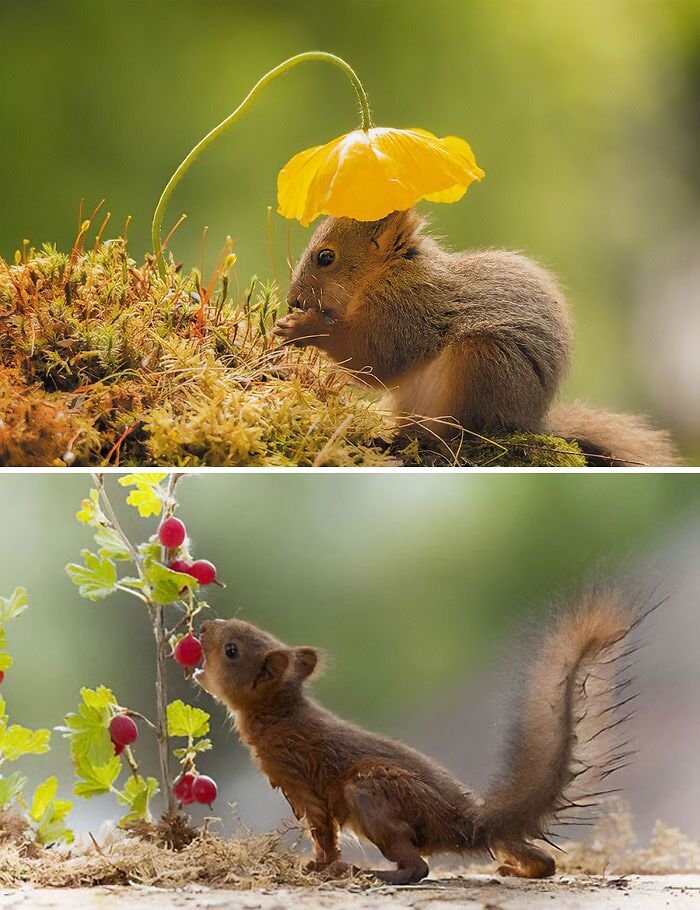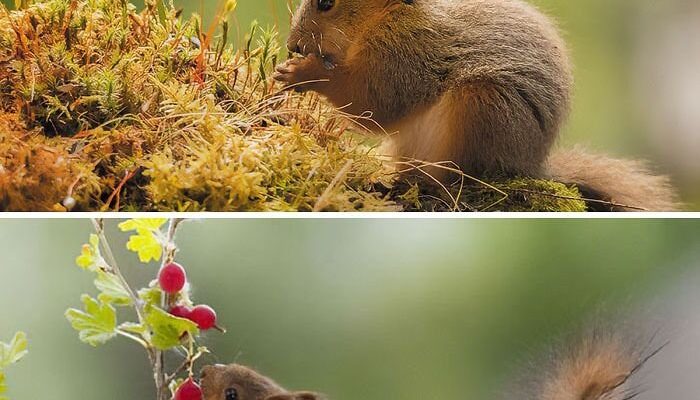
Take a moment to picture a squirrel in winter. While we humans might grumble about the cold, squirrels are busy preparing for the chill. They’ve got a few tricks up their furry sleeves, allowing them to thrive even when the weather turns rough. From choosing the right habitats to storing food effectively, squirrels demonstrate an impressive adaptability that deserves closer examination.
Understanding Squirrel Behavior
Squirrels are known for their energetic nature, but there’s more to their behavior than just running around. These animals are smart and strategic when it comes to finding food and shelter. Tree squirrels, in particular, often choose habitats that provide both security and resources.
For instance, they prefer areas with plenty of trees, where they can build nests high above the ground. This not only keeps them safe from predators like hawks or snakes but also gives them easy access to food sources such as nuts and berries. Interestingly, squirrels have a unique way of remembering where they’ve buried their food. They use mental maps, almost like creating a mental treasure hunt for themselves, which helps them later on when food is scarce.
Another striking aspect of their behavior is their incredible ability to adapt. Squirrels might change their foraging patterns based on the season or the availability of food. When winter approaches, you might notice them more intensely gathering and storing food. This behavior ensures they have enough to last through the cold months when food is hard to come by.
Building Cozy Nests
When the weather turns harsh, one of the first things that squirrels think about is making their home cozy and safe. They often build nests called dreys, which are usually made from leaves, twigs, and even fur. These nests are often tucked away in the branches of tall trees.
Have you ever noticed how those nests look kind of like a big ball of fluff? That’s no accident! This design helps keep the cold out during winter. The insulation from the materials they use helps to maintain a stable temperature inside. Squirrels might also take advantage of existing holes in trees to add extra shelter.
In addition to drays, some squirrels will use tree cavities to escape from the wind and snow. Imagine curling up in your favorite blanket on a cold day. That’s exactly what they’re doing! These modifications to their living spaces showcase their cleverness and resourcefulness in the face of challenging environments.
Finding Food in Tough Times
Let’s face it: food is a crucial part of survival, especially when conditions get tough. Squirrels are primarily herbivores, munching on nuts, seeds, fruits, and sometimes even fungi. During harsh winters, when these resources can get scarce, they rely heavily on their food-storing habits.
As mentioned earlier, squirrels are known for burying their food, but it goes deeper than that. They often locate food caches in various spots, so when one area is picked clean, they have others to fall back on. They can remember where they’ve hidden their snacks for months, relying on both memory and scent to retrieve their buried treasures.
It’s not just about storing food; it’s also about knowing which types of nuts and seeds are best for survival. For instance, acorns and hickory nuts are packed with energy, making them staple foods. So, when you see a squirrel foraging, know they’re not just playing around; they’re strategizing for the long haul!
Staying Safe from Predators
In nature, survival isn’t just about finding food; it’s also about avoiding becoming someone else’s lunch. Squirrels have several strategies to stay safe from predators. Their agility and speed are prime defenses. They can make sharp turns and leap from branch to branch, which helps them evade birds of prey like hawks or even curious cats.
Another fascinating tactic they use is their ability to play dead. Yes, you read that right! If a predator gets too close, a squirrel might just freeze in place, hoping to blend in with its surroundings. It’s a clever move that can buy them crucial seconds to escape or remain unnoticed.
Additionally, squirrels often rely on their social behaviors. They are known to warn each other of impending danger through vocalizations. Imagine them chatting away in their own squirrel language, alerting fellow squirrels that a danger is lurking. It’s teamwork at its finest!
Dealing with Severe Weather
When winter hits hard, it’s not just food scarcity that squirrels have to worry about—severe weather can also pose a significant threat. Snow, ice, and freezing temperatures can make survival challenging. But squirrels have a few tricks up their sleeves to deal with these conditions.
For starters, they tend to stay hidden during extreme weather. When the temperature drops and storms loom, squirrels will retreat to their nests and hunker down. This behavior conserves energy and reduces the risk of exposure to harsh elements.
During these times, squirrels rely heavily on their food stores. It’s almost like having a stocked pantry during a snowstorm. By having well-hidden caches, they can munch on their finds without having to venture far from their cozy nests, making it easier to ride out the storm.
Interestingly, some species of squirrels have even been known to change their fur color with the seasons. They grow thicker, warmer fur during winter to help retain body heat. It’s nature’s way of ensuring they are dressed appropriately for the weather!
Lessons from Squirrels
So, what can we learn from these little adventurers? Squirrels teach us the value of preparation and adaptability. They know how to make the best of whatever environment they find themselves in. Just think about it: if they can thrive in the freezing cold or during a food shortage, surely we can find ways to face our own challenges.
Their instinct to store food is a reminder to plan for the future. We can apply that lesson in our own lives, whether it’s saving money for a rainy day or keeping a well-stocked pantry. The way squirrels adapt their behaviors based on the seasons is also a great reminder that flexibility is key in life—sometimes we have to change our plans or strategies to cope with new obstacles.
When you observe these little creatures in your backyard or park, take a moment to appreciate the resilience. Squirrels remind us that even in the harshest environments, survival is not just about instinct; it’s about being clever, strategic, and ready for anything.
In conclusion, squirrels are much more than playful garden visitors. Their survival strategies in harsh environments are fascinating and full of valuable lessons. The next time you spot a squirrel busy gathering food or building a cozy nest, remember that they are experts at adapting and thriving in even the toughest conditions. Isn’t it incredible how nature equips these little beings to face the challenges of life?

